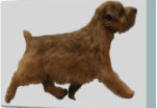


Health & Nutrition













DNA Testing Available for Norfolk Terrier Ichthyosis" Kelly Credille, DVM, PhD and
Robert Dunstan, DVM, MS. Researchers have
found the gene that causes it and they now have a test to determine if dogs are
carriers,clear, and confirm affected.
In 1999 the Comparative Dermatology Laboratory in the College of Veterinary
Medicine at Texas A&M University was funded by the Morris Animal Foundation to
study an inherited skin disease of the Norfolk Terrier. This disease was brought to the
attention of Dr. Bob Dunstan, director of the Dermatology Lab, by a breeder
concerned about a mild skin condition affecting one of their dogs. Dr. Dunstan
recognized that this canine disease is very similar to a rare inherited skin disease of
people called "epidermolytic hyperkeratosis", often included in a family of diseases
characterized by scaly or dry skin known as the "ichthyoses". These diseases are
associated with a defect in structural proteins of the skin known as keratins. After
three years of research that involved the sequencing of three keratin genes, we
discovered that keratin 10, a protein important for the integrity of the outer layers of
the skin, is mutated in dogs that have this condition. This disease is inherited in a
recessive manner in Norfolk Terriers, meaning that two mutated genes are needed to
produce clinical symptoms. If a dog has only one copy of the mutated gene, the dog
appears normal but is called a carrier because if it mates with another carrier and the
defective gene from the sire and the dam are passed to an offspring, the puppy will
have the disease. The disease is present at birth but the signs are subtle. You may
note that the skin of affected puppies is more grey than pink in color. In our
experience, as dogs age the skin changes progress but are always mild. Dandruff and
darkening of the skin are the main symptoms in adults, signs that can also occur in a
number of skin diseases. There may be a greasy texture to the skin or hair but hair
loss is not a feature of this condition. You may note the formation of very thin, fragile
blisters in areas that are lightly
rubbed.
At this time we do not have a good idea how prevalent this altered gene is in the
Norfolk Terrier population. The number of affected dogs appears to be low and this
suggests the mutation may not be common; however, if a popular sire was a carrier
and his offspring were inbred, it is possible that the disease-causing gene could be
present in many Norfolk Terrier kennels. In addition, the symptoms of this skin
disease are mild and are not very specific, thus some affected dogs may not be
recognized. Because we have identified the specific mutation causing this condition,
our lab can now perform a simple DNA test to definitively identify Norfolk Terriers that
are clear, carriers or are affected with this skin disease. To date, we have diagnosed
this disease in seven dogs by examining skin biopsy samples and have subsequently
confirmed this diagnosis at the molecular level with the DNA test. We have also
confirmed the carrier status of parents of affected dogs and some littermates of
affected dogs. All testing will be confidential and our charge will be $85 per dog


- Behavior
- Honor Roll
- Living With Norfolk Terriers
- Fun With Your Norfolk
- Tip Of The Week
- Publications
- Therapy and Service Dogs
- Health & Nutrition
- Competition


- Books
- Clubs
- Collectibles, Gifts & Fun Activities
- Companion Animal Recovery
- Dog Show Superintendents
- Genetics
- Health Related Sites
- Canine Health Links
- Vaccination Protocols
- Animal Health Trust
- Online Mendelian Inheritance In Animals
- Univ. Of Cambridge Vet. School
- Canine Inherited Disorders Database
- All Creatures Veterinary Hospital
- A First Aid Kit
- Veterinary Pet Insurance
- AKC Pet Health Plan
- Cornell Univ. College of Vet. Medicine
- More Health Related Sites
- Independent Sites
- Pet Travel
- Training Your Puppy
- Publications


- Breeding Tips
- Breeding Tips Page One
- Breeding Tips Page Two
- Breeding Tips Page Three
- Breeding Tips Page Four
- Breeding Tips Page Five
- Breeding Tips Page Six
- Virus &The Pregnant Bitch
- Dog Neutering Video
- Vaccinations & The Pregnant Bitch
- Incontinence In The Pregnant Bitch
- Flagyl & The Pregnant Bitch
- Canine Reproduction
- Frozen vs Chilled Semen
- Modern Breeding Management
- Dialogue On Rasberry Leaves
- Monitoring Pregnancy
- Uses For Vaginal Cultures
- OFA & The Pregnant Bitch
- Breeding Tips Page Seven
- Breeding Tips Page Eight
- Breeding Tips Page Nine
- Breeding Tips Page Ten
- Breeding Tips Page Eleven
- Breeding Tips Page Twelve
- Breeding Tips Page Thirteen
- Breeding Tips Page Fourteen
- Genetics And Inheritance
- Rescue









